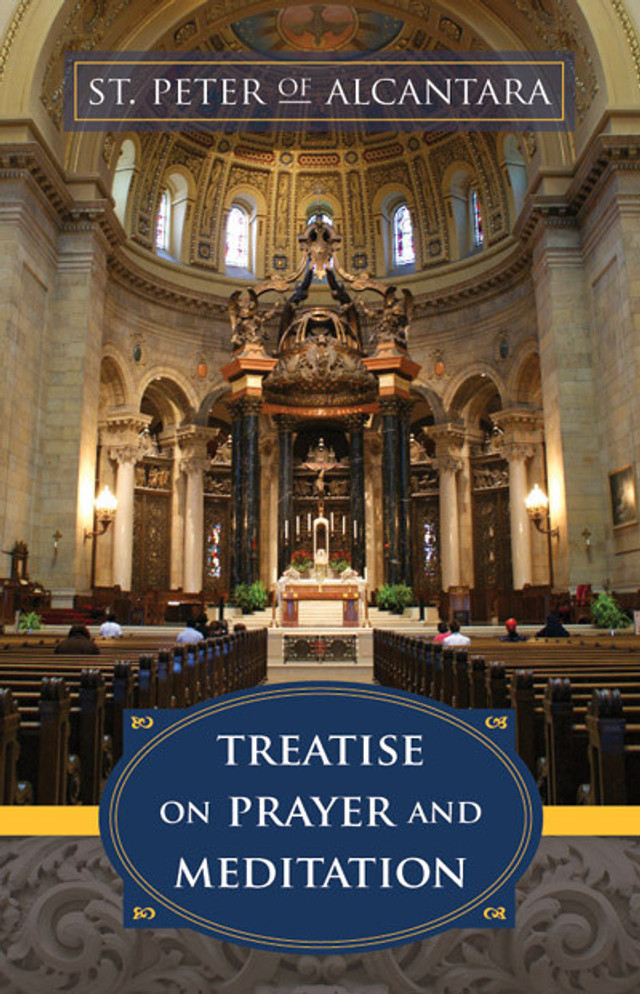Prayer joined with consideration helps the soul advance greatly in virtue. Here, Saint Peter of Alcantara reveals the fruits of prayer joined with consideration and the effects it has on cultivating virtue.
Prayer and Consideration Help Kindle Virtuous Affections
Prayer likewise when it is joined with consideration (as ordinarily it is wont to be) helpeth no less than Consideration itself: yea sometimes it helpeth much more. For consideration commonly is not occupied any further but only about enkindling of some one of these virtuous affections: but prayer (when it is attent, and devout, and is withal accompanied with spirit, and fervency of the mind,) is wont to stir up all these virtues aforesaid. For when the soul presenteth herself before almighty God with an earnest great desire to appease his wrath, and to desire him of mercy, then there is no stone so hard, but that it is moved hereunto. I mean hereby, that there is no holy affection, but that it is then wholly exercised and employed to this purpose. And it fareth in this case as it doth with a mother, that is desirous to still her child, or as it doth with a good and loving wife, that hath a desire to pacify her husband, when she perceiveth him to be angry: In which cases, they are wont to omit no means they can devise, that may anywise further the matter. Forsomuch as in prayer the religious soul accuseth herself before almighty God: there with the publican she is confounded, and ashamed for her sins, and offences: there she purposeth an amendment of life: there she humbleth herself, and trembleth before the supreme divine majesty. There she believeth: there she hopeth: there she loveth: there she adoreth: there she praiseth: there she giveth thanks for all benefits: and there she offereth sacrifice unto almighty God, both for herself, and for all her neighbors. All these things be performed in a devout prayer. And because the habits of virtues do increase with the exercise of their acts, hereof it proceedeth, that the soul by means of this exercise of prayer remaineth very much beautified, and perfited in these virtues. As St. Lourentius Justinianus affirmeth in these words.
In the exercise of prayer the soul is cleansed from sin: Charity is nourished: Faith is illuminated: Hope is strengthened: the spirit is comforted: the bowels are mollified: the heart is quieted: truth is discovered: temptation is overcome: heaviness is put to flight: the senses are revived: the strength that was weakened is repaired: lukewarmness is abandoned: the rustiness of vices is consumed: and in this exercise the lively sparkles of heavenly desires do rise up, and shew themselves, among which burneth the flame of the love of God.
By this we understand, that prayer is a most convenient exercise for that man, that mindeth to reform his manners, and life, and to change himself into an other man. As our Savior hath plainly signified unto us in the mystery of his glorious transfiguration, whereof St. Luke writeth thus: that as he was praying in the mount, he suddenly transfigured himself in such wise, that his face shined very bright like the son, and his garments became white like snow.
Our Savior could right well have transfigured himself at other times, than at prayer, if it had pleased him: But he would of very purpose be transfigured whiles he was at prayer: to signify unto us in the transfiguration of his body, what virtue prayer hath to transfigure our souls: that is: to make them to lose the customs of the old man, and to clothe them with the new man, which is created after the image of God. There it is, where the understanding is illuminated with the beams of the true sun of justice, and where the garments, and ornaments of the soul are renewed, and become whiter than snow. This is the very thing, that almighty God signified to holy Job, when he said.
The Exercise of Consideration Greatly Benefits the Soul
What? Is it by thy wisdom, that the hawk pruneth, and changeth her feathers, when she beateth her wings against the south? Certainly it is a thing greatly to be wondered at, that this bird knoweth how to cast of her old feathers, and how to feather herself with new. And that for this purpose, she seeketh the hot air of the south, that with the heat thereof her pores may be opened, and with her moving the old feathers fall off, and so give place to the new, that begin to spring out. But how much more wonderful is it, to see a soul unclothe herself of Adam, and to put on Christ, to change the conditions of the old man, and to adorn herself with the conditions of the new man? Now this change that is so wonderful is then wrought, when the devout soul turneth herself to the south, and there beateth her wings in the air. And what is it to turn herself to the south, but to lift up her spirit to the consideration of the eternal light, and to the beams of the true sun of justice? And what is it to beat her wings in the air, but to be there sighing and panting with heavenly affections, and desires, calling upon almighty God, with great anguish of mind, and desiring most humbly his favor and grace? For then bloweth the air of the south, that is the heavenly refreshing of the holy Ghost, who with his temperate heat, and sweet moving, strengtheneth, and helpeth us to cast of all the old feathers of the old Adam, that they may give place to the new feathers of virtues, and holy desires, which there do begin to grow, and bud out. And this is that thing, that Ecclesiasticus signified by other words, he said, They that fear our lord will prepare their hearts, and sanctify their souls before him. The which is principally done in the exercise of devout prayer. For there it is, where the soul presenteth herself most familiarly before almighty God, (as St. Bernard saith.) And there it is, where by approaching near unto the everlasting light, she seeth more clearly her own defects, and so bewaileth, and accuseth them, and seeketh remedy for them, desiring our lord of his grace, and fully purposing an amendment on her part, and thus by little and little she sanctifieth and amendeth her life. Thou seest now good Christian reader, what a great help this exercise of consideration is, towards the obtaining of those most high, and excellent virtues, which are (as we have said) peculiar to a Christian man.
ooo
This article is taken from a chapter in Of Prayer and Meditation by Saint Peter of Alcantara which is available from TAN Books.









